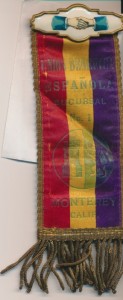Memory and Oblivion in the Spanish Diaspora
I’m back in Monterey, California, following up on the story of the Spanish immigrants who settled in this area in the early decades of the 20th century. I’m constantly surprised both by the ubiquity of photographs, stories, and objects related to the Republic and the Spanish Civil War, and by the relative oblivion into which the history of those things has fallen among the descendants of those immigrants.
It seems quite clear that for the parents of the people I am interviewing, the Spanish Civil War was a definitive moment; and yet for their descendants it seems at times as if the war took place in another galaxy. Parents’ prized objects seem almost like meteorites that have fallen out of the clear blue sky:
See an example here: Republican artifacts in Monterey, California
It will be a real challenge to understand and interpret the disconnect between the intensity of the experience for the parents and the amnesia that seems to have set in among the children. There are obvious, objective reasons for this forgetting: the people I am interviewing were small children when the war took place, and seventy-five years do not pass in vain. And yet, as I talk with these folks, as I examine their family albums and listen to their repertoire of stories, I get the feeling that the passage of time does not adequately explain the degradation of the memory. They DO remember the meetings, the songs, the fundraising, the colors, the tension with the Catholic church, etc., but it all seems somehow decontextualized, depoliticized.
Is that decontextualization and depoliticization merely a result of the fact that my informants were children at the time?Perhaps. Perhaps not.













